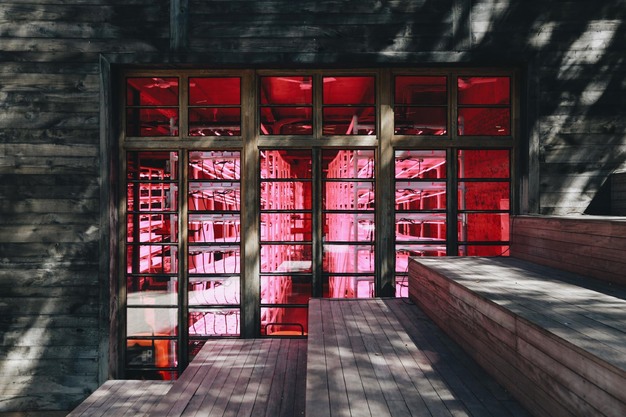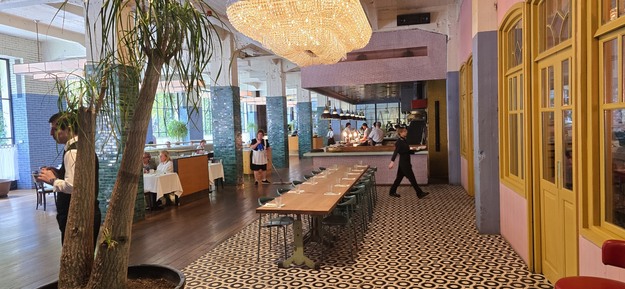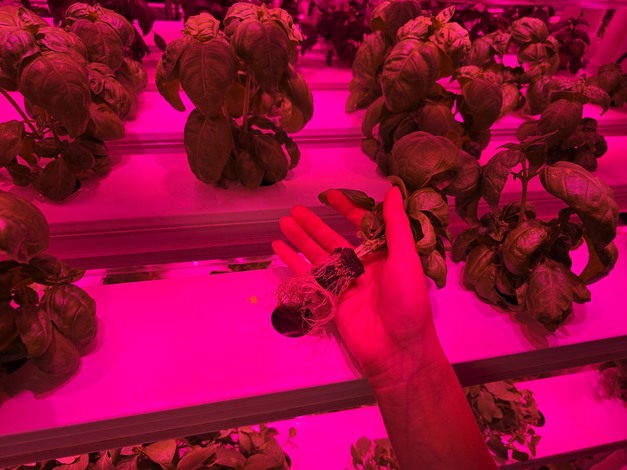In a building that once housed a newspaper printing press in Tbilisi, now transformed into a dynamic space with a hotel, in-house restaurant, co-working areas, an art gallery, and event zones, SpaceFarms has found its home. Since 2019, this Georgian vertical farm has been quietly supplying fresh herbs, microgreens, and leafy greens to the kitchen just meters away.
The journey started before that. Tusya Garibashvili, the founder and driving force behind SpaceFarms, got her start in urban farming with a project called Urban Greens, which she launched with a close friend. "Back then, no one here even knew what microgreens were — and to be honest, neither did I. But I was curious… and curious enough to try," says Tusya.
 © Ani Gabashvili
© Ani Gabashvili
In a building that once housed a newspaper printing press in Tbilisi, SpaceFarms has found its home.
That early experiment quickly gained traction. In 2018, with support from the Adjara Group, known not just for their hotels and restaurants but also for their ventures in almond production and regenerative farming, Tusya had the opportunity to bring her vertical farming vision to life inside one of Tbilisi's most iconic hospitality spaces: Stamba Hotel.
 © FreshPlaza
© FreshPlaza
Stamba Hotel, the home of SpaceFarms, is a dynamic space with a hotel, an in-house restaurant, co-working areas, an art gallery, and event zones in the heart of Tbilisi.
Harvested the same day — grown to order
SpaceFarms doesn't grow in bulk. It grows on demand for various restaurants in the capital. Whatever chefs request in the morning gets harvested that same afternoon. Most clients, often chefs themselves, pick it up directly. "We're right here in the city, so it's super convenient."
Some greens go out with roots still attached; others are freshly cut. "We sow only what's needed," Tusya explains. "Some of our seeds come from Koppert Cress, which ensures exceptional quality, and nothing goes to waste. It takes coordination, but it works."
 © FreshPlaza
© FreshPlaza
Some greens go out with roots still attached; others are freshly cut.
The most popular items? Genoves basil, shiso, and pea shoots. But the offering goes well beyond that, pak choi, mizuna, edible flowers… "I often give chefs free samples to try new flavors," she adds. "That keeps things fresh, literally and creatively."
Why chefs love it
Vertical farming isn't just a trend. For restaurants, it's practical. "Our clients can rely on a consistent supply, even in winter," Tusya says. "They get unique ingredients that no one else has. Sure, it costs a bit more, but they gain freshness, stability, and the assurance that no chemicals were used." And then there's the environmental factor: up to 75% less water use, virtually no waste, and zero transport emissions. "It's farming designed for cities and for the future."
 © Ani Gabashvili Tusya Garibashvili, the founder and driving force behind SpaceFarms
© Ani Gabashvili Tusya Garibashvili, the founder and driving force behind SpaceFarms
Technology behind the greens
Behind the clean, fresh greens is a deeply technical system. "I've spent years learning everything, light intensity, humidity, irrigation, pH, oxygenation. Every plant has its own needs," says Tusya.
Some components of the infrastructure are created in Georgia, while others come from the U.S., U.K., Netherlands, and other EU countries. Today, the six racks inside Stamba produce around 450 kilograms of greens each month, precisely calibrated and monitored.
Spots by SpaceFarms
Building on the success of the original farm, Tusya launched Spots by SpaceFarms— compact, fully automated vertical farms designed to fit anywhere. Each Spot takes up just 2 square meters and can produce 10–15 kg of greens per month. "They're perfect for restaurants, hotels, apartment buildings, even industrial spaces," Tusya explains. "We provide the seedlings, and one of our technicians visits twice a week to keep everything running smoothly."
 © Ani Gabashvili
© Ani Gabashvili
Clients range from The Telegraph Hotel, a member of Leading Hotels of the World, to boutique restaurants and even the Volvo Car Showroom in Tbilisi. "It's a plug-and-play system. You don't need to know anything about farming, it's all taken care of."
Scalable by design
SpaceFarms Spots are already installed in 11 restaurants around Tbilisi, with plans to expand to Batumi on the Black Sea coast and eventually into international markets, Spain, the Middle East, and beyond. "The model is incredibly scalable," Tusya says. "You can grow in a basement, a rooftop, or even a hotel lobby. Wherever there's a bit of space, there can be greens."
More than just a business
For Tusya, SpaceFarms is also about education and awareness. She regularly offers guided tours and works with schools and universities to help people, especially children, better understand food production. "There's something magical about showing students how you can grow food in the heart of the city, using barely any water. It makes them realize food doesn't just appear on supermarket shelves. There's a whole story behind it."
 For more information:
For more information:
Tusya Garibashvili (founder)
SpaceFarms
14 Merab Kostava St (Stamba Hotel)
Tbilisi, Georgia
[email protected]
www.spacefarms.ge










